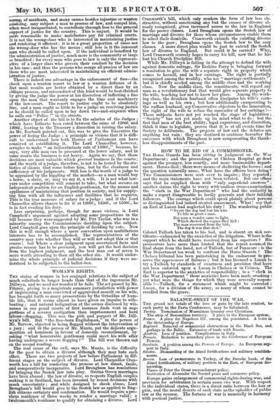HOW TO BE RID OF A COMMISSIONER.
Tut Horse Guards has been- sitting in judgment on the War Department ; and the proceedings at Chelsea Hospital go dead against the younger, less courtly, and more businesslike depart- ment. Horses died ; there were means of sheltering the horses ; and the question naturally arose, What have the officers been doing c' Two Commissioners were sent over to inquire; they reported; and the main statements have not been refuted. But one officer says that he supplied them with "only superficial answers" - another claims the right to worry with-endless cross-examination the "clerk in the War Department" who had the audacity to make a report disagreeable to lordly generals and their faithful followers. The courage which could speak plainly about persons so distinguished had indeed created amazement. What ! say that an Earl of Lucan had neglected his duty ! The wondering public
" Swore the dog had lost his wits To bite so great a man.
But soon a wonder came to light, Which showed the rogues they lied : The man recovered from the bite, The dog it was that died."
Colonel Tulloch has taken to his bed, and is absent on sick oar- tificate—exhausted by the anxieties of the litigation. Where is the support which he should have received from his superiors ? His prosecutors have more than hinted that the repiort assumed its final shape from the hand, not of Tulloeh, but of Panmure : is the War Department too weak to confront the Horse Guards ? The Chelsea tribunal has been painstaking in the endeavour to pre- serve the appearance of fairness ; but it has licensed a Luoan to try a Tulloch by standards of exactness and precision that have not been enforced upon a Lucan in Chelsea or in Crimea. The Earl is superior to the anxieties of responsibility ; to a " clerk in the War Department " those anxieties have been made crushing yet what, were the things for which they were severally respon- sible ?—Tulloch, for a statement which might be corrected - Lucan, for a division of the army, so many of whom cannot be recalled from the grave.


























 Previous page
Previous page